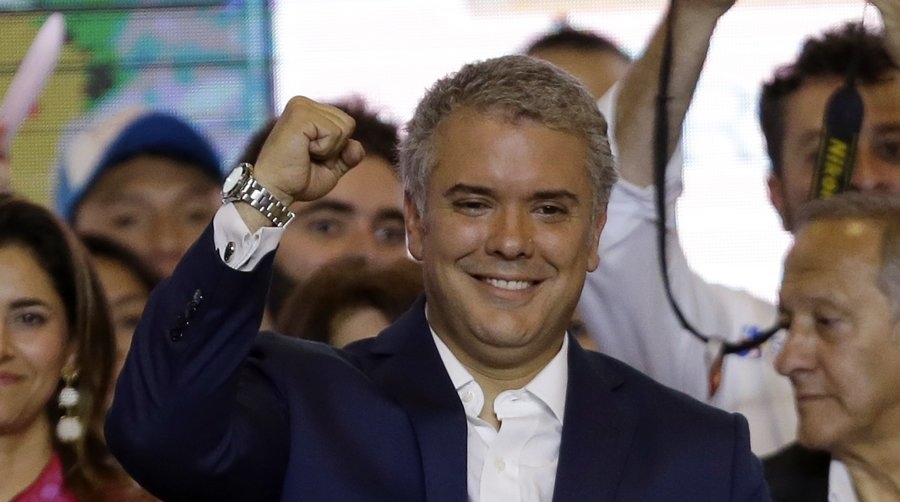Colombia Elects New President
June 18, 2018 | Expert Insights

Ivan Duque, right-wing conservative, is all set to be Colombia’s President after sweeping past Gustavo Petro on 17th June.
The new President is set to maintain the orthodox economic model and possibly alter the peace deal with FARC.
Background
Colombia’s ancient history is marked by the Quimaya Civilisation, the Muisca Confederation and the Tairona Chiefdoms who settled in the land which now constitutes Central America and the northern tip of South America. Spanish colonisation in the 19th century was driven by desire for Latin American gold alongside a thriving trade-based economy run on indigenous slave labour and plantations. Motivated by the myth of El Dorado, the “Conquest of Muisca” saw the rapid expansion of Spanish settlements across Colombia.
The country gained independence in 1819 after a struggle led by Símon Bolivar, as Gran Colombia which included parts of modern day Venezuela, Panama, Ecuador and Peru. The Republic of Colombia was established in 1886 and Panama seceded in 1903 under US influence. Since 1960’s, Colombia has faced an asymmetrical, low-intensity conflict between Colombian forces, crime-syndicates and guerrilla groups. It is historically rooted in the conflict known as La Violencia, which was triggered by the 1948 assassination of populist political leader Jorge Eliécer Gaitán.
The Revolutionary Armed Forces of Colombia (FARC) began with small farmers and landowners following Marxist-Leninist ideology to reclaim property from wealth private groups who were sold large tracts of land in 19th and 20th century to service the country’s debt. Thus, Colombia, like many other Latin American states, was subject to conflict to end the oligarchy-based status-quo. The conflict gave the foundation for a thriving drug trade where officials and police personnel were easily bought off by drug cartels that were more rich and powerful than the government of Colombia itself.
Unlike the Medellin cartel, the Cali cartel invested money from the drug trade into pharmaceuticals and were “more refined” to deal with, according to the Drug Enforcement Administration (DEA). Years of conflict and drug trafficking through the dense jungles of the Amazon had ruined Colombia’s political and economic future until the 2016 Peace Accord. The Accord, signed by Juan Manuel Santos and Timochenko, would finance the reintegration of guerrilla fighters into Colombian society on the condition that the FARC give up all their arms.
The political history of Colombia has been dominated by two opposing groups, which were divided into the Liberal Party and the Conservative Party, linked to the followers of Simón Bolívar, Colombia's liberator and first president. Colombia wrote a new Constitution in 1991, and several guerrilla groups entered local politics thereafter. FARC became a political party called the Common Alternative Revolutionary Force.
Modern industries like shipbuilding, electronics, automobiles, tourism, construction, and mining, grew dramatically during the 2000s and 2010s. However, most of Colombia's exports are still commodity-based. New exploration is needed to offset declining oil production. Colombia is a resource rich country which is currently facing rising inflation and unemployment alongside large-scale immigration of Venezuelans seeking refuge and jobs.
Analysis
In the recent elections, Iván Duque, a hardline conservative and the protégé of former President Alvaro Uribe, won nearly 54% of the votes. Former M19 guerrilla fighter Gustavo Petro came in second with around 42% of the votes, while remaining centrist candidates won the remaining 4%.
Critics have compared Duque’s opponent Gustavo Petro to the likes of Venezuelan Hugo Chavez. As mayor of Bogotá, he had success reducing prices for public transportation and gave subsidized water to the poor. Petro intended to redistribute land, eliminate the need for oil and coal and overturn the existing economic model which has favoured wealthy oligarchs.
Surrounded by friends and family, Duque thanked voters for handing him the biggest electoral victory in Colombia’s history based on number of votes received. “With humility and honor, I tell the Colombian people that I will give all my energies to unite our country. No more divisions,” Duque told a crowd of cheering supporters in Bogota. “I will not govern with hatred.”
A one-term senator, Duque worked at the Inter-American Development Bank in Washington until 2014, when Uribe asked him to return to Colombia and take a seat in Congress. Duque’s running mate, Marta Lucia Ramirez, will be Colombia’s first female vice president.
Duque has vehemently opposed the Peace Accord with FARC rebels. It gives the FARC ten congressional seats for the next eight years, and creates a transitional justice system (JEP), that dictates maximum sentences of 8 years of restricted liberty for FARC members who confess their crimes. Since FARC’s political participation is protected by legislation, Duque will be incapable of altering legislation which allows for their political participation before they have served time in jail. However, he can alter the JEP and its provisions which requires support of the President.
FARC leader Rodrigo Londono, known as Timochenko, congratulated Duque on Twitter, calling for reconciliation and saying he respected the Colombians’ decision.
Assessment
Our assessment is that Ivan Duque will address the needs of both the conservative elite and the middle-class by offering economic change. We believe that the Peace Accord will face significant opposition in Congress. However, negotiations can lead to compromise on both sides which will help the weakest sections of Colombia who are prone to joining rebel groups.
Read more - Colombia’s presidential candidates








Comments